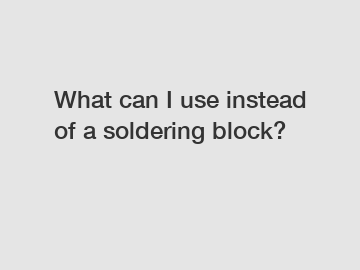What can I use instead of a soldering block?
Soldering is a fundamental technique used in various crafts and DIY projects. Whether you're an experienced jewelry maker or a hobbyist tinkering with electronics, having the right tools is essential. However, if you find yourself without a soldering block, fear not! In this blog post, we will delve into a range of alternative materials that can serve as suitable substitutes for soldering blocks. Let's unlock your creativity and explore unconventional solutions!
1. Fire Bricks:
Fire bricks are designed to withstand extremely high temperatures, making them an excellent alternative to traditional soldering blocks. These bricks come in different sizes, shapes, and densities, allowing you to adapt them to your specific needs. They provide a stable surface to hold your workpiece and distribute heat evenly, ensuring precise soldering. Whether you are working with intricate jewelry pieces or larger metallic projects, fire bricks are reliable and readily available in most hardware stores.

2. Ceramic Tiles:
If you happen to have spare ceramic tiles lying around, don't let them go to waste! Ceramic tiles are heat-resistant and provide a smooth, flat surface perfect for soldering. Depending on the tiles' dimensions, they can accommodate a range of project sizes. Simply place your workpiece on the tile and solder away. Consider using metal clips or clamps to secure smaller items for added stability.
3. Graphite Blocks:
Graphite blocks are excellent conductors of heat and offer a non-stick surface, making them a popular choice among jewelry makers. They come in various sizes and are relatively lightweight, allowing for easy maneuverability. Additionally, due to their low thermal expansion, graphite blocks reduce the risk of thermal shock during the soldering process. This alternative is particularly useful for delicate soldering tasks that require precise control over temperature and minimal damage to your workpiece.
4. Charcoal Blocks:
Charcoal blocks, typically used by jewelry makers, offer numerous advantages as an alternative to soldering blocks. These blocks excel in heat retention, ensuring a consistent soldering temperature. Additionally, the porous structure of charcoal blocks absorbs excess heat, preventing distortion or melting of surrounding materials. Furthermore, the inherent softness of charcoal allows you to create grooves or depressions to securely hold your workpiece. While commonly used for jewelry soldering, charcoal blocks can also cater to other small-scale projects.
5. Pumice Stones:
Often found in beauty products or as a foot scrub, pumice stones may seem like an unlikely soldering alternative. However, their lightweight nature and remarkable thermal insulation properties make them suitable for specific soldering applications. Pumice stones can withstand moderate heat while acting as a supporting surface. Additionally, their porous texture minimizes contact between the workpiece and the stone, creating better ventilation and reducing the risk of overheating your project.
Conclusion:
When faced with the absence of a soldering block, exploring alternative materials can open up a world of possibilities. Each substitute mentioned above offers unique properties that cater to specific soldering requirements. Remember, improvisation is key to unleashing your creativity! So, grab that fire brick from the garden, repurpose that spare ceramic tile, or try out the non-traditional charcoals and pumice stones. Embrace the unexpected and find innovative ways to achieve your soldering goals. Happy soldering!
The company is the world’s best Silicon Carbide Foam, ceramic foam filter, ceramic filter for steel casting supplier. We are your one-stop shop for all needs. Our staff are highly-specialized and will help you find the product you need.
212
0
0


Comments
All Comments (0)